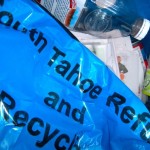Garbage bills going up for South Shore customers
By Kathryn Reed
Garbage rates are expected to go up throughout the South Shore starting May 1.
The joint powers authority that oversees waste matters agreed to recommend the rate increase earlier this month. Now the three jurisdictions – South Lake Tahoe, El Dorado County, and Douglas County – need to approve the hike.
Fees are slated to go up 4.48 percent in El Dorado County, and 4.97 percent in South Lake Tahoe and Douglas County. For residential customers this equates to a monthly increase of $1.20 in El Dorado County, $1.15 in South Lake Tahoe and 77 cents in Douglas County. This means monthly rates become $27.97 in El Dorado County, $24.33 in South Lake Tahoe, and $16.33 in Douglas.
South Tahoe and El Dorado have unlimited service and Douglas has one 32-gallon can for those monthly rates.
The city and El Dorado County elected officials are expected to vote on the matter May 1, with the increase taking effect immediately. Douglas County officials did not respond to a request to find out when the vote would be taken nor is any information on the website.

Recyclables don't have much of a return in terms of cash, but they do keep garbage out of landfills. Photo/LTN
Through South Tahoe Refuse company’s franchise agreements with the three jurisdictions it is allowed to ask for a rate increase every three years. Normally it comes on Jan. 1. But last year the company with the JPA, which has an official from each of the jurisdictions, worked out a process to streamline the process.
“What we tried to do was standardize the rate application so all three jurisdictions are on the same level,” explained Gerri Silva, director of Environmental Management for El Dorado County. “We tried to go through and define what is a good index. Some of us used COLAs, some used CPI.”
With this and future rate increase proposals the Garbage and Trash Index will be used to help determine rates.
The idea is this method will eliminate spikes.
Jeff Tillman, president of the South Lake Tahoe-based refuse company, said all of his costs are going up – landfill charges, fuel, insurance, everything – so the increase is needed.
STR employees have gone without a raise for four years, the pension has been cut, and less equipment is being used.
“We are trying to make it work,” Tillman said, acknowledging no one likes any bill to go up.
While STR is recycling 66 percent of the garbage it collects – exceeding the state mandate – there is little money to recover from those products. What does come in is not profit; it goes into the base rate calculations.
Things beyond STR’s control have diminished its income. The homeowners who did not rebuild after the Angora Fire no longer pay a garbage bill.
Foreclosed properties also don’t have an STR bill.
“When the properties were demolished at Stateline that was a huge chunk,” Tillman told Lake Tahoe News.
When something gets built at “the hole” then STR will have several more clients to bill.
Commercial service is based mostly on how many times the dumpster is emptied. With so few people in town this winter, not much garbage was produced, so bills were light for those property owners – which in turn means revenue is down for STR.